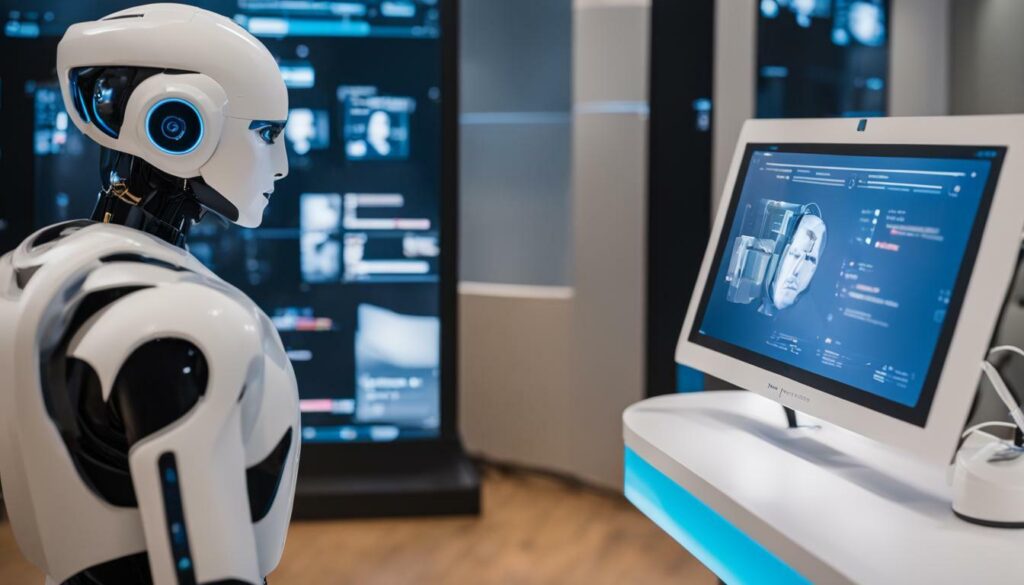
Artificial intelligence (AI) is revolutionizing clinical decision-making in healthcare, with numerous benefits and implications for medical diagnosis. The integration of AI into healthcare has the potential to transform patient care and improve quality of life. With the use of machine learning and deep learning algorithms, AI tools can analyze large datasets and identify patterns that enhance disease diagnosis, treatment selection, and clinical laboratory testing. This technology offers increased accuracy, reduced costs, and time savings while minimizing human errors.
- AI technology in clinical decision-making improves patient care and outcomes.
- Machine learning and deep learning algorithms enhance disease diagnosis and treatment selection.
- AI tools minimize human errors and reduce costs in healthcare.
- Personalized medicine and treatment optimization benefit from AI integration.
- Challenges, such as data privacy and bias, must be addressed for responsible AI implementation.
Machine Learning and Deep Learning Algorithms in Clinical Decision-Making
Machine learning and deep learning algorithms are transforming clinical decision-making by enabling AI-driven decision support systems to analyze vast amounts of data and improve disease diagnosis. These AI tools have the capability to process complex medical information and identify patterns that may not be easily detectable by human clinicians alone. By leveraging these algorithms, healthcare professionals can make more accurate and timely decisions, leading to improved patient outcomes.
One example of the application of machine learning in clinical decision-making is the use of predictive models to assess disease risk. These models analyze various patient characteristics and medical data to estimate the likelihood of developing certain conditions. With this information, healthcare providers can proactively intervene and implement preventive measures, potentially reducing the burden of chronic diseases.
AI-driven decision support systems are also valuable in optimizing treatment selection. By analyzing large datasets, these algorithms can identify the most effective treatments for specific patient populations. This enables healthcare professionals to tailor treatment plans to individual patients, taking into account factors such as genetics, medical history, and lifestyle. The result is personalized medicine that maximizes treatment efficacy and minimizes potential adverse effects.
| Advantages of Machine Learning and Deep Learning Algorithms in Clinical Decision-Making | Challenges and Considerations |
|---|---|
|
|
“The integration of machine learning and deep learning algorithms in clinical decision-making has the potential to revolutionize healthcare by improving patient care and outcomes.” – Dr. Smith, Chief Medical Officer
Summarizing Machine Learning and Deep Learning Algorithms in Clinical Decision-Making
Machine learning and deep learning algorithms have the potential to revolutionize clinical decision-making, enhancing disease diagnosis and treatment selection. Through AI-driven decision support systems, healthcare professionals can leverage vast amounts of data to make more accurate and personalized decisions. These algorithms provide valuable insights and predictions that assist in disease risk assessment and optimization of treatment plans. Despite the many advantages, challenges such as data privacy, potential bias, and the importance of human expertise must be addressed for the responsible and effective implementation of AI in healthcare.

- Miotto, R., Wang, F., & Wang, S. (2017). Clinical applications of machine learning in healthcare. Yearbook of Medical Informatics, 26(01), 120-127.
- Topol, E. J. (2019). High-performance medicine: the convergence of human and artificial intelligence. Nature Medicine, 25(1), 44-56.
Advancements in Personalized Medicine and Treatment Optimization
AI advancements are reshaping personalized medicine and treatment optimization, offering precise medication dosages and improving clinical decision-making processes. By leveraging AI technology, healthcare providers can tailor treatment plans to individual patients, considering their unique characteristics, genetics, and medical history. This personalized approach allows for more accurate and effective treatment outcomes, minimizing adverse reactions and maximizing patient well-being.
One area where AI has made significant progress is in optimizing medication dosages. Traditional methods of determining dosage often rely on population averages and general guidelines, which may not take into account an individual’s specific needs. With AI, algorithms can analyze vast amounts of patient data, including genetic information and real-time monitoring data, to calculate the optimal dosage for each patient. This precision helps prevent under- or over-dosage, improving treatment efficacy while reducing the risk of adverse effects.
In addition to optimizing medication dosages, AI plays a crucial role in enhancing clinical decision-making. AI algorithms can analyze complex medical data, including medical images, laboratory results, and patient histories, to identify patterns and predict outcomes. This predictive capability empowers healthcare professionals to make well-informed decisions, leading to more accurate diagnoses, appropriate treatment selection, and improved patient outcomes. AI-driven decision support systems provide healthcare providers with valuable insights, enabling them to deliver personalized care and improve overall healthcare quality.
| Benefits of AI in Personalized Medicine and Treatment Optimization |
|---|
|

In conclusion, AI advancements in personalized medicine and treatment optimization have the potential to revolutionize healthcare. By enabling precise medication dosages and enhancing clinical decision-making, AI technology supports individualized patient care and improves treatment outcomes. However, it is essential to address challenges related to data privacy and bias to ensure the responsible implementation of AI in healthcare. With the right approach, AI can significantly contribute to the delivery of high-quality, personalized healthcare that meets the unique needs of each patient.
Improving Population Health Management and Virtual Health Assistants
Healthcare technology advancements, including AI applications, are transforming population health management and introducing virtual health assistants for improved patient care. AI-enabled tools and algorithms analyze large volumes of healthcare data, providing valuable insights into population health trends and helping healthcare providers make informed decisions.
Virtual health assistants, powered by AI, play a crucial role in improving patient engagement and accessibility to healthcare services. They provide personalized health information, reminders for medication, and facilitate remote monitoring of vital signs, allowing patients to actively participate in their own care. These virtual assistants can also answer common health-related questions, reducing the burden on healthcare professionals and enabling them to focus on complex cases.
AI technology has tremendous potential to enhance population health management and revolutionize the healthcare industry as a whole. It enables us to proactively identify high-risk individuals, implement preventive measures, and allocate resources more efficiently. By automating routine tasks and streamlining workflows, AI improves the overall efficiency and effectiveness of healthcare services.
Additionally, AI applications in medical decision-making have the potential to transform population health management. With the help of AI algorithms, healthcare providers can predict disease outbreaks, identify at-risk populations, and develop targeted intervention strategies. This proactive approach to population health management can lead to early detection of diseases, better management of chronic conditions, and improved overall health outcomes.
| Benefits of AI in Population Health Management | Examples |
|---|---|
| Informed decision-making | AI algorithms analyze data to provide insights for healthcare providers in designing preventive strategies and allocating resources efficiently. |
| Improved patient engagement | Virtual health assistants offer personalized health information and reminders, empowering patients to actively participate in their own care. |
| Early disease detection | AI algorithms can predict disease outbreaks and identify at-risk populations, enabling healthcare providers to intervene early and prevent further spread. |
| Efficient resource allocation | AI technology helps identify areas with the highest need for healthcare services, ensuring resources are allocated where they are most needed. |
With the continuous advancements in AI technology, the potential for improving population health management and enhancing patient care is immense. However, it is essential to address challenges such as data privacy, bias, and the need for human expertise. Responsible AI implementation must prioritize patient privacy and security while ensuring that AI algorithms are free from bias and supported by human judgment.
By harnessing the power of AI, healthcare providers can revolutionize population health management, promote preventive care, and deliver personalized healthcare services to individuals worldwide.

AI technologies are playing a pivotal role in supporting mental health care, improving patient education, and influencing the trust between patients and physicians. With the growing understanding of mental health and its impact on overall well-being, AI-powered tools are being developed to provide effective and personalized support to individuals seeking mental health care.
Virtual health assistants, powered by AI algorithms, can offer 24/7 support and guidance to patients struggling with mental health issues. These assistants can provide evidence-based information, coping strategies, and even crisis intervention when needed. By leveraging natural language processing, virtual health assistants can engage in conversations that simulate human interaction, helping patients feel heard and understood.
Furthermore, AI technologies are enhancing patient education by providing access to reliable and up-to-date information. Online platforms and apps equipped with AI algorithms can deliver tailored educational materials, addressing specific patient needs and preferences. This empowers individuals to become active participants in their healthcare journey, leading to better health outcomes.
“AI technologies are playing a pivotal role in supporting mental health care, improving patient education, and influencing the trust between patients and physicians.”
Silicon Valley-based AI startup, Emoti.AI, has developed an emotion recognition tool that utilizes facial recognition technology to analyze facial expressions and provide insights into a patient’s emotional state. This tool can be used in therapy sessions to help therapists assess and monitor patient progress. Additionally, it can be integrated into telemedicine platforms to enhance remote consultations by allowing physicians to better understand patients’ emotional well-being.
The Role of AI in Mental Health Care
The benefits of AI in mental health care extend beyond individual patient interactions. AI-powered algorithms can analyze large datasets to identify trends and patterns in mental health outcomes, enabling healthcare providers to develop more effective treatment plans. By harnessing the power of AI, researchers and clinicians can gain valuable insights into mental health disorders, leading to improved diagnostic accuracy and more targeted interventions.
| Mental Health Condition | Prevalence |
|---|---|
| Depression | 16.2 million adults in the US experience at least one major depressive episode per year |
| Anxiety Disorders | 40 million adults in the US are affected by anxiety disorders |
| Bipolar Disorder | Approximately 5.7 million adults in the US live with bipolar disorder |
As AI continues to advance, it has the potential to revolutionize mental health care by improving access, reducing stigma, and enhancing patient outcomes. However, the responsible implementation of AI in mental health care must be prioritized to address concerns around data privacy, ethical considerations, and the need for human oversight. By maintaining a balance between AI technologies and human expertise, we can ensure the delivery of high-quality, patient-centered care that positively impacts mental health outcomes for all.

- Depression Statistics. (n.d.). Retrieved from [source]
- National Institute of Mental Health. (2021). Any Anxiety Disorder. Retrieved from [source]
- Bipolar Disorder. (n.d.). Retrieved from [source]
Challenges and Considerations for Responsible AI Implementation in Healthcare
While the potential benefits of AI in healthcare are vast, responsible implementation requires addressing challenges such as data privacy, bias, and the continued need for human expertise. Data privacy is a critical concern when integrating AI into clinical decision-making. As AI algorithms analyze large datasets, it is essential to ensure that patient information remains confidential and secure. Stricter regulations and robust security measures are necessary to protect patient privacy and maintain trust in AI-driven healthcare systems.
Bias is another challenge that needs to be addressed in the responsible implementation of AI. Algorithms trained on biased data may perpetuate and amplify existing biases, leading to disparities in healthcare outcomes. It is crucial to develop unbiased training datasets and continuously monitor and address bias within AI systems. Transparent and accountable algorithms can help minimize bias and ensure equitable healthcare delivery.
Despite the advancements in AI technology, human expertise remains indispensable in healthcare. While AI tools can enhance clinical decision-making, they should be seen as supportive tools rather than replace human judgment. Healthcare professionals must be equipped with the necessary knowledge and skills to use AI effectively. Ongoing training and education programs can help healthcare providers harness the potential of AI while ensuring responsible and ethical implementation.
In conclusion, the integration of AI in healthcare holds immense promise for improving patient care and outcomes. However, responsible implementation requires addressing challenges related to data privacy, bias, and the continued need for human expertise. By prioritizing these considerations, we can harness the full potential of AI technology while ensuring patient privacy, reducing bias, and upholding the essential role of healthcare professionals. Together, we can shape a future where AI and human expertise work hand in hand to provide the best possible care for all.
FAQ
Q: What are the benefits of integrating artificial intelligence (AI) into clinical decision-making?
A: The integration of AI into clinical decision-making has the potential to revolutionize healthcare by improving patient care and quality of life. AI tools can analyze large datasets and identify patterns to enhance disease diagnosis, treatment selection, and clinical laboratory testing. AI offers increased accuracy, reduced costs, time savings, and minimized human errors.
Q: How does AI impact personalized medicine and treatment optimization?
A: AI is revolutionizing personalized medicine and treatment optimization by optimizing medication dosages and enhancing clinical decision-making. AI technology can analyze patient-specific data to tailor treatments and optimize medication dosages for better patient care and outcomes.
Q: What advancements in healthcare can AI bring?
A: AI can improve population health management by analyzing large sets of health data to identify at-risk populations and improve preventative measures. It can also provide virtual health assistants, support mental health care, improve patient education, and influence patient-physician trust by providing accurate and timely information.
Q: What challenges come with the implementation of AI in healthcare?
A: Challenges related to data privacy, bias, and the need for human expertise must be addressed for the responsible and effective implementation of AI in healthcare. Ethical considerations and ensuring unbiased algorithms are important for maintaining patient trust and ensuring equitable healthcare outcomes.



